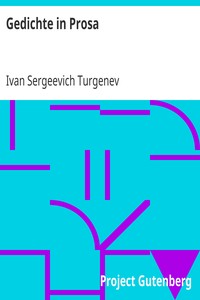Gedichte in Prosa by Ivan Sergeevich Turgenev
"Gedichte in Prosa" by Ivan Sergeevich Turgenev is a collection of prose poetry likely written in the mid-19th century. This work transports readers into the peaceful yet profound landscapes of rural Russia, reflecting on themes of life, nature, love, and the human condition through vivid imagery and emotional contemplation. Turgenev's prose often captures the beauty and simplicity of village life while juxtaposing it with deeper philosophical musings. The opening portion introduces a
serene rural scene, setting a warm and aromatic July day in the Russian countryside. The narrator describes the idyllic features of the village, with soundscapes of chirping birds and gentle animals, showcasing a deep appreciation for the tranquil life of the peasants. Through beautifully painted descriptions, Turgenev invites readers to feel a sense of nostalgia and longing for the simplicity of nature. Additionally, the narrative hints at philosophical reflections on existence and the human experience, suggesting a dialogue between the serenity of nature and the complexities of urban life. (This is an automatically generated summary.)
Read or download for free
| How to read | Url | Size | |||
|---|---|---|---|---|---|
| Read now! | https://www.gutenberg.org/ebooks/37716.html.images | 150 kB | |||
| EPUB3 (E-readers incl. Send-to-Kindle) | https://www.gutenberg.org/ebooks/37716.epub3.images | 128 kB | |||
| EPUB (older E-readers) | https://www.gutenberg.org/ebooks/37716.epub.images | 129 kB | |||
| EPUB (no images, older E-readers) | https://www.gutenberg.org/ebooks/37716.epub.noimages | 124 kB | |||
| Kindle | https://www.gutenberg.org/ebooks/37716.kf8.images | 249 kB | |||
| older Kindles | https://www.gutenberg.org/ebooks/37716.kindle.images | 232 kB | |||
| Plain Text UTF-8 | https://www.gutenberg.org/ebooks/37716.txt.utf-8 | 125 kB | |||
| Download HTML (zip) | https://www.gutenberg.org/cache/epub/37716/pg37716-h.zip | 123 kB | |||
| There may be more files related to this item. | |||||
Similar Books
About this eBook
| Author | Turgenev, Ivan Sergeevich, 1818-1883 |
|---|---|
| Title | Gedichte in Prosa |
| Note | Reading ease score: 83.7 (6th grade). Easy to read. |
| Contents | Das Dorf -- Ein Zwiegespräch -- Die Alte -- Der Hund -- Der Widersacher -- Der Bettler -- Erfahren wirst du noch, wie Toren richten -- Ein Zufriedener -- Eine Lebensregel -- Das Ende der Welt. Ein Traum -- Mascha -- Der Dummkopf -- Eine Legende des Morgenlandes -- Zwei Vierzeiler -- Der Sperling -- Die Totenschädel -- Die Tagelöhner und der Weißhändige. Ein Gespräch -- Die Rose -- Letztes Wiedersehen -- Ein Besuch -- Necessitas – Vis – Libertas. Ein Basrelief -- Das Almosen -- Das Insekt -- Die Kohlsuppe -- Die Gefilde der Seligen -- Zwei Reiche -- Der Greis -- [78] Der Berichterstatter -- Zwei Brüder -- Dem Andenken an Fräulein J. P. Wrewskaja -- Der Egoist -- Das Fest beim höchsten Wesen -- Die Sphinx -- Die Nymphen -- Freund und Feind -- Christus -- Der Stein -- Die Tauben -- Morgen! Morgen! -- Die Natur -- Hängt ihn! -- Was ich wohl denken werde -- Wie frisch und duftig waren doch die Rosen -- Eine Seefahrt -- N. N. -- Halt inne! -- Der Mönch -- Noch wollen wir kämpfen! -- Das Gebet -- Die russische Sprache. |
| Credits |
Produced by Norbert H. Langkau, Evelyn Kawrykow and the Online Distributed Proofreading Team at http://www.pgdp.net |
| Language | German |
| LoC Class | PG: Language and Literatures: Slavic (including Russian), Languages and Literature |
| Subject | Russia -- Social life and customs -- Fiction |
| Category | Text |
| EBook-No. | 37716 |
| Release Date | Oct 11, 2011 |
| Most Recently Updated | Feb 22, 2012 |
| Copyright Status | Public domain in the USA. |
| Downloads | 88 downloads in the last 30 days. |
| Project Gutenberg eBooks are always free! | |

